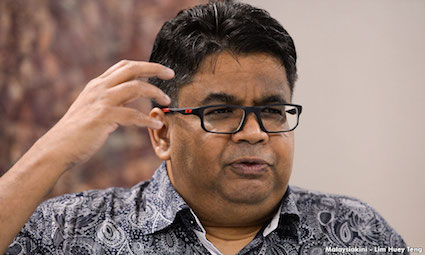Malaysia entering dangerous waters

Rais Hussin, Malaysiakini
Close to one-third of Malaysia’s economy is driven by exports, a legacy of learning from Japan.
When Japan was trying to recover from the devastating experience of World War II in 1945, Japan turned to supplying the US with all that it needed to win the Korean War in 1950, and yet again when the Vietnam War which began in earnest in 1962.
By 1968, close to half a million US troops were stationed in Vietnam. Japan could grow out from its own economic devastation, as well as meet the demands of the US war effort in Northeast and Southeast Asia.
There have been no wars in Southeast Asia since 1979, the last being China’s border incursion of Vietnam “to teach Vietnam a lesson”, not to invade Cambodia as a neighbouring state. This as the late Deng Xiaoping said it.
Malaysia’s economic prosperity, from a GDP of RM47 billion in 1957, has largely been grown on the back of commodities exports (rubber and tin), graduating to oil and gas exports from the 1970s onwards, and later electronics as well.
Yet, from the latest report of Nomura Research, it seems that Malaysia will be facing some serious financial and economic headwinds in 2019. There is a need to understand why Nomura has been the first to suggest the possibility of a ratings downgrade on Malaysia.
While Moody’s has threatened to do the same, it hasn’t deployed the same level of language that Nomura did. It can, and it will if Malaysia does not try to attempt a serious structural reform of the economy.
Both Nomura and Moody’s appear to subscribe to the notion that Malaysia has what can be called a “balance sheet economy,” not unlike what Japan had once had.
In a balance sheet economy, the economy can keep growing non-stop, not merely due to exports alone, but to the extent the private sector and leading GLICs keep growing and spawning other GLCs.
In a balance sheet economy, everything and everyone at the top is interconnected. Almost all economic exchanges are done on the basis of repeated transactions from the past and not genuine economic breakthroughs.
Poor getting poorer
Thus, there is no economic revolution in income differentials and the rich get richer while the poor get poorer, leading to a wealth pyramid that is wide at the bottom but narrow at the top.
The top will protect the wealth nests of each other thus creating a positive balance sheet for themselves, but not others. Something similar has been happening in Malaysia.
The KLSE is heavily weighted to the latter. Some 70 percent of the exchange is linked to GLICs and GLCs. Their stocks dominate the Malaysian economic landscape like no other. One can even name the key GLICs such as PNB, EPF, the Ministry of Finance Inc, LTAT and Tabung Haji.
Through the optics of the now scandalous 1MDB, for instance, one can see how each one of the GLICS was used to bail 1MDB out, with or without a sound business plan.
The goal was to generate a good balance sheet to make the former prime minister Najib Abdul Razak look capable and astute; which he was not.
When Nomura and Moody’s threatened to downgrade Malaysia’s economy, the fear stemmed from their analysis that Malaysia cannot change both structurally and systematically.
In fact, there is no will as yet to change by the Economic Affairs Ministry, as all energies seemed spent on going through the bad books of the previous administration.
But Malaysia must not lose hope. If Malaysia works with Qatar and Turkey, these three dynamic economies in different regions of the world can still achieve some key breakthroughs.
The key is not to lapse into inter and intra-Muslim state conflicts like that in many parts of the world.
In fact, if Turkey and Qatar both pivot to Malaysia to Look East together to China, Japan, South Korea and Asean, which when collectively combined have close to 2.5 billion middle-class consumers, all three countries stand to gain.
To gain from a global economic bonanza that has been simmering at twice the growth rate of most economies in the developed world, the future is Indo East Asia. And, Turkey, Qatar and Malaysia are all within this region.
If they can be driven by apps, artificial intelligence, algorithms and analytics all three will have joined the fourth industrial revolution too.

